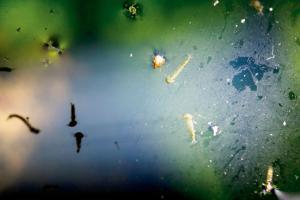Tries rarely-used method to stop malaria mosquitoes from breeding around Mantralaya

This picture has been used for representational purpose/Getty Images
BMC's insecticide department head Rajan Naringrekar told mid-day on Friday that Temephos granules that were used in the past, albeit sparingly, on the rooftops of buildings to check mosquito breeding, are being used now in Metro 3 pits.
Also read: Mantralaya precinct hit by dengue, malaria scare
"Temephos granules are used in places where water keeps accumulating because of ground water sources (like in deep Metro pits) and flows out. In such a scenario, liquid insecticide doesn't work effectively. The granules are coated with soluble insecticide (organophosphate larvicide) that treats water infested with disease-carrying insects, including mosquitoes, midges, and black fly larvae," he said.
Naringrekar added that no new cases have been reported from the Mantralaya precinct.
"We visited every flat and inspected the area thoroughly," he said. It was also learned that, as expected, the BMC hasn't sent any notice to the Mumbai Metro Rail Corporation Ltd (MMRCL) on healthcare regulations. It has only sent a formal letter asking it to follow the norms to prevent the breeding of mosquitoes. Naringrekar said MMRCL has ensured full cooperation and was following BMC's advice.
Also read: National Dengue Day: This monsoon, steer clear of dengue
Prevention at all sites: MMRCL
MMRCL, which is building the underground Metro 3, has taken necessary precautions to prevent mosquito breeding at the sites, said an official spokesperson. Fogging with pesticides is being done on a regular basis and BMC guidelines to keep the place clean and prevent water stagnation are also being followed. The BMC is also conducting regular inspection of the construction sites.
Catch up on all the latest Crime, National, International and Hatke news here. Also download the new mid-day Android and iOS apps to get latest updates
 Subscribe today by clicking the link and stay updated with the latest news!" Click here!
Subscribe today by clicking the link and stay updated with the latest news!" Click here!











